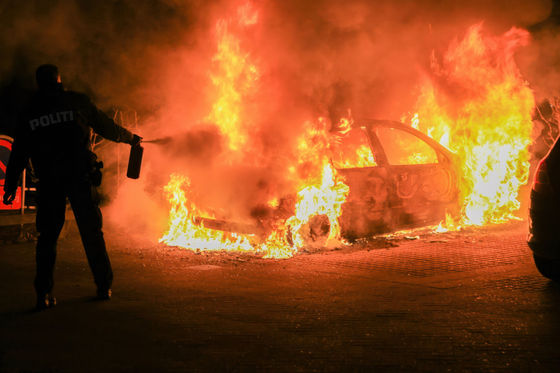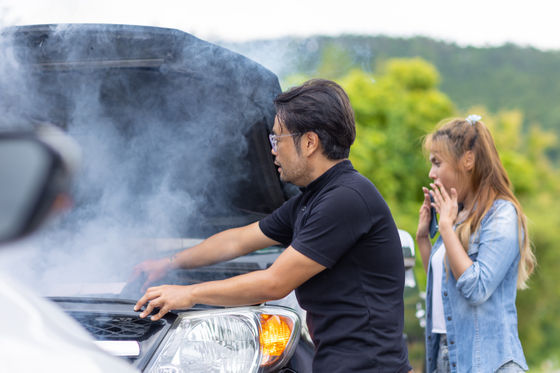What to know if your EV battery suddenly catches fire

Many electric vehicles (EVs) are equipped with the same lithium-ion batteries as smartphones and mobile batteries, which poses the risk of fire. In August 2024, a Mercedes-Benz EV equipped with a Chinese-made
Electric vehicle battery fires—what to know and how to react | Ars Technica
https://arstechnica.com/cars/2024/08/electric-vehicle-battery-fires-what-to-know-and-how-to-react/
What causes lithium-ion battery fires? Why are they so intense? And how should they be fought? An expert explains
https://theconversation.com/what-causes-lithium-ion-battery-fires-why-are-they-so-intense-and-how-should-they-be-fought-an-expert-explains-214470
◆ EV Safety
EV batteries are generally safe, with only four EV battery fires reported in Australia between 2010 and 2023. A total of 900 EV battery fires are expected between 2023 and 2050, which is not a large number given the total number of cars on the roads in Australia.
Matthew McDowell, co-director of the Georgia Institute of Technology's Advanced Battery Center in the US, said battery fires due to manufacturing defects are extremely rare, especially in EVs, which also have battery management systems.
However, EV batteries store a huge amount of energy and can burst into flames in the event of an accident, so firefighters receive special training to extinguish EV fires.

How do EV fires occur?
If an EV battery is damaged for any reason, it may catch fire due to a phenomenon called
EV batteries can be damaged for a variety of reasons, but Greg Les, director of the University of Michigan Battery Institute, categorizes EV battery fires into two categories: 'accidents' and 'manufacturing defects.' Crashes that puncture the battery or charging errors all fall into the 'accident' category.
'Let's put aside the idea of battery fires in accidents for the moment, because we all know that battery fires in accidents can occur in any type of vehicle,' Les said.
Regardless of the cause, all battery fires are difficult to put out, but fires caused by manufacturing defects are particularly frightening for consumers because they can occur at any time. For example, in 2016, Samsung's Galaxy Note 7 smartphone was hit by a series of batteryexplosions that ultimately led to a major recall issue.
Samsung to completely halt sales and replacement of Galaxy Note 7 that explodes even after replacement, and offer full refunds to customers who request discontinuation of use - GIGAZINE

According to Les, the cause of the battery catching fire due to the defect is in the design. 'If there is a problem somewhere in the design, the cell shorts out, generating heat, which causes the liquid electrolyte to evaporate and generate gas inside the cell. The heat then causes it to explode, which then spreads to other cells,' Les said.
It has been pointed out that the aforementioned EV fire in South Korea is likely to have developed into a large-scale fire due to this mechanism.
What to do if an EV fire occurs in an accident
The National Fire Protection Association says that if an EV catches fire while driving, you should immediately stop the vehicle in a safe place and get off the highway. Once you stop the vehicle, turn off the engine and have all occupants exit the vehicle immediately without searching for any belongings. In addition, you should stay at least 100 feet (about 30 meters) away from the burning vehicle before calling the fire department.
When a fire breaks out, the first thing that comes to mind is to throw water on it to put it out in its initial stages, but in the case of an EV fire, you should not try to put it out yourself by throwing water on it. A battery fire is a chemical fire, and it takes 10 to 40 times as much water to put out an EV fire as it does in a gasoline-powered vehicle, so it cannot be put out by just throwing a little water on it. There is also a risk of serious injury from flames bursting out or debris exploding when approaching the car.

If an EV battery catches fire, pouring water on it could actually make the fire worse, rather than putting it out, because the water can react with the lithium to produce flammable hydrogen gas, which can then explode.
Firefighters responding to EV fires have traditionally sprayed water on the battery to cool it down, but in some cases they may decide to monitor the battery until it burns out without spraying water. For example, Tesla's (PDF file)
It may be tempting to go retrieve any valuables you left in your car once the fire is out, but this is also a big no-no, as the battery still has energy in it and may reignite hours or even days after the fire has been put out.
Battery fires also pose a risk of inhaling harmful fumes, so if you are going near a burning EV, you should wait until local fire authorities have assessed the overall situation and declared it safe to do so.

◆How to drive an EV safely?
First, any batteries found to be defective must be recalled and replaced as soon as possible, and overcharging batteries must be avoided, as this increases the risk of them catching fire.
Although they are not widely used at the time of writing, experts are excited about the arrival of EVs equipped with solid-state batteries .
'Solid-state batteries have the potential to offer better thermal stability than lithium-ion batteries, and they don't use liquid electrolytes, eliminating the most flammable element of batteries,' McDowell said.
Related Posts:
in Vehicle, , Posted by log1l_ks







